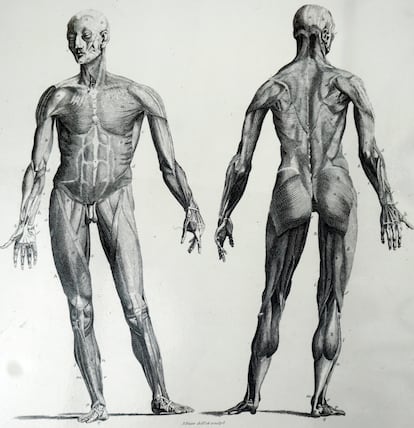Testosterone parties: the latest Silicon Valley fad
At ‘T-parties’, the fare is macrobiotic food, bodybuilding gear and blood tests


It’s a straightforward theory, but difficult to validate: masculinity declined between 1960 and the end of the 20th century. This decline is attributed to cultural, social, psychological and political influences, as well as biological indicators such as lower sperm counts, less muscle mass and declining testosterone levels.
Those who bemoan the alleged decline have rushed to offer solutions to alleviate, redirect and reverse it. In the academic sphere, Of Boys and Men by Richard Reeves suggests survival strategies for male “identity” in a post-feminist world. Similarly, Niall Ferguson espouses a neo-imperialism that infuses virility into the geopolitics of the Western world, while Jordan Peterson wants a “male reaction” against “radical feminism.” Strategies to restore lost manhood abound in the American far-right, ranging from the use of drugs and steroids to Greco-Roman bodybuilding to renouncing masturbation. How about a testicle-tanning machine to increase virility?
The entrepreneurial ecosystem of Silicon Valley faced a crucial decision: should they address the crisis of masculinity? Jeff Tang, a self-proclaimed “biohacker,” and Andros Wang said yes and co-founded a unique startup in San Francisco called T-Party. The two then set out to quantify and “resolve” this problem using technology and science.
Testosterone will set you free
Tang organizes “T-Parties” — meetings for male consciousness-raising and “therapy.” He believes that men must actively maintain their manhood by keeping testosterone levels at optimal levels — the higher, the better.
Despite the name of the company, which evokes the conservative Tea Party movement and the anti-British colonial tax revolt, Tang and Wang’s company doesn’t appear to be navigating a Trumpist orbit. Nor is it an angry reaction against feminism. Tang says they just want to promote healthy lifestyles and “positive” masculinity.
The premise of the company is based on recent studies that have identified a gradual decrease in blood testosterone levels in the United States, Denmark, and other developed countries. Tang decided that since the essence of manhood is clearly waning, male well-being and quality of life were at risk.
In August, Liz Lindqwister wrote a biting story in The San Francisco Standard about T-parties for young men interested in testosterone as an elixir of youth and wellness. They met in a fancy apartment in the Marina neighborhood, near San Francisco Bay. The apartment was adorned with tapestries depicting Greek gods, bodybuilding equipment, barrels of ice water for “toning” dives, and trays of smoked salmon, matcha tea and macrobiotic juices. Tang and Wang hired a phlebotomy technician to draw vials of blood and test the hormone levels of guests — businessmen, senior managers and software designers — who paid between $100-$400 to attend. They gave their blood and waited patiently for the results.
While they waited, Tang, an enthusiastic 27-year-old who frequently injects humor into his didactical explanations, described how low testosterone levels can be caused by stress, lack of sleep, inactivity, alcohol and drug use, an inadequate diet and misguided exercise programs. The solution, therefore, lies in reversing these habits and adopting a disciplined approach to diet, exercise, and lifestyle.
But that’s not all. Tang aims to create community self-help groups (T-Parties) where men interested in biological hacking can understand the importance of testosterone. These groups provide safe spaces for male interaction, allowing members to periodically monitor their “virility” indicators and share results. The ideas is, by sharing effective strategies and optimal levels of testosterone, participants can positively impact their general health.
No injections or pills
The novelty of Tang’s approach, according to Lindqwister, is that he offers “natural” recipes that seem sensible and scientific. They were specially designed for men who have already abandoned quick fixes and magic solutions from “gym bros trying to sell you supplements or doctors trying to sell you hormone injections and prescription medication.” While the two T-Party founders aren’t biologists or doctors, they rely on the guidance of experts like Robert Sapolsky, a neuroendocrinology researcher, author and professor at Stanford University.
In an article for Business Insider by Lakshmi Varanasi, Tang said, “I’m just a guy who likes experimenting with his health and productivity” who boosted his own testosterone “from 790 to 1090 [nanograms per deciliter of blood] and peer-reviewed research.”
In May, Tang went to Colombia and staged his first “testosterone festival.” Twenty-four men under 40 came to provide blood samples and listen to a presentation after the mandatory (and healthy!) ice bath. The next session took place in New York, followed by one in San Francisco that drew significant media attention. T-parties were now officially a fad, but how long would it last?
Tang and Wang are reviving the biohacking trend, which involves optimizing the body through lifestyle changes and technological aids. It gained popularity in the 2010s, endorsed by the likes of billionaire Richard Branson and lifestyle coach Tony Robbins. This time around, the focus is exclusively on men, targeting the androgen that regulates the libido, hair growth, muscle development, sperm production and bone health. The goal is to scientifically restore virility. Similar to numerous technological trends, biohacking has transformed in the last 20 years.
The essence of masculinity?
In his book Testo Junkie, Paul B. Preciado explains that testosterone — the male hormone secreted by testicles — has a profound influence on health and the biochemistry of sensitivity. Low levels of testosterone can lead to reduced sexual desire, persistent fatigue, muscle loss, irritability, depression and erectile dysfunction. Very high levels can lead to mood swings, aggressive and erratic behavior, and greater susceptibility to cardiovascular diseases and prostate cancer.
Testosterone, simply put, is one of several physical factors that need to be balanced, similar to blood pressure or body mass index. The good news is that maintaining this balance usually doesn’t require much effort. The normal or healthy range for adult men under 50 is quite broad, between 300 and 1,000 nanograms per deciliter of blood. Specifically, a recent study at the University of San Diego suggests a normal range of 270 to 1,070. However, there’s no evidence that values close to 1,000 are superior in terms of health or emotional well-being compared to values at the lower end of the normal range.
As men age, the levels of the androgen hormone in their blood tend to decrease. This is part of the natural process known as andropause, where the average reduction is around 1.6% annually starting from the age of 40. It’s important to note that a total value below 150 nanograms is considered a pathological level, associated with a rare condition called late-onset hypogonadism (LOH) that can impact quality of life. Additionally, research suggests that there is a gradual decline in average hormone levels in specific age groups and countries. However, scientists have yet to reach a consensus on the exact causes or their significance.
According to medical anthropologist and sexuality/gender expert Alexis Ruth Matza, monitoring testosterone levels is generally not necessary unless there are abnormal declines due to aging or hormonal therapies during sex reassignment. In most other cases, says Matza, the connection between testosterone levels and masculine identity is influenced more by cultural perceptions than biological evidence.
If masculinity is indeed waning, Matza doesn’t believe the slight and gradual decreases in testosterone levels observed in recent years are the cause. The latest biohacking fad seems to be an attempt to fix something that isn’t broken. It might even be an excuse for men fixated on their masculinity to compete for highest testosterone bragging rights.
Sign up for our weekly newsletter to get more English-language news coverage from EL PAÍS USA Edition
Tu suscripción se está usando en otro dispositivo
¿Quieres añadir otro usuario a tu suscripción?
Si continúas leyendo en este dispositivo, no se podrá leer en el otro.
FlechaTu suscripción se está usando en otro dispositivo y solo puedes acceder a EL PAÍS desde un dispositivo a la vez.
Si quieres compartir tu cuenta, cambia tu suscripción a la modalidad Premium, así podrás añadir otro usuario. Cada uno accederá con su propia cuenta de email, lo que os permitirá personalizar vuestra experiencia en EL PAÍS.
¿Tienes una suscripción de empresa? Accede aquí para contratar más cuentas.
En el caso de no saber quién está usando tu cuenta, te recomendamos cambiar tu contraseña aquí.
Si decides continuar compartiendo tu cuenta, este mensaje se mostrará en tu dispositivo y en el de la otra persona que está usando tu cuenta de forma indefinida, afectando a tu experiencia de lectura. Puedes consultar aquí los términos y condiciones de la suscripción digital.








































